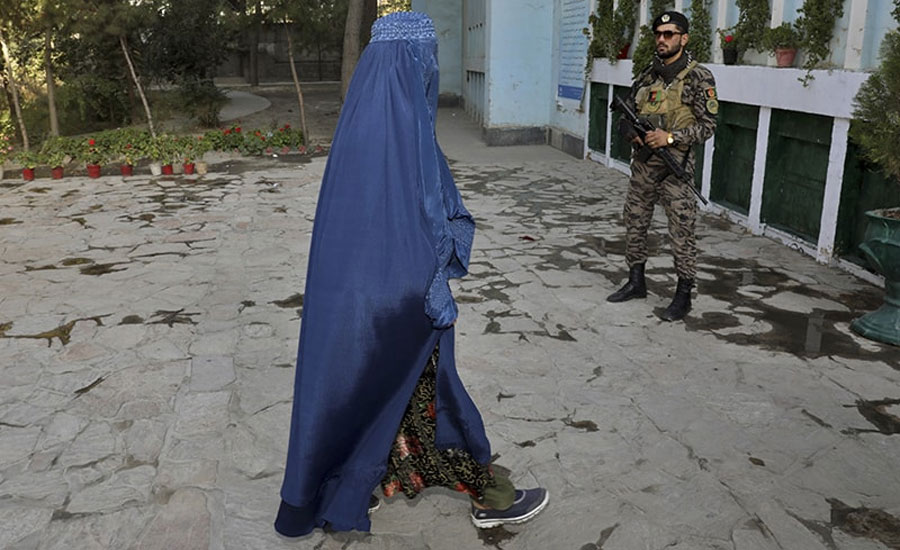Presidential election: Afghans cast vote amid deadly violence and killings

KABUL - Afghans tuned to polling stations amid tight security on Saturday to elect new president of the country, as Taliban insurgents unleashed a string of attacks on polling centres throughout the country that killed at least five people.
The first-round vote marked the culmination of a bloody election campaign that, despite a large field of candidates, is seen as a close race between President Ashraf Ghani and his bitter rival Abdullah Abdullah, the country's chief executive.
Authorities placed Kabul under partial lockdown, flooding streets with troops and banning trucks from entering the city in an effort to stop would-be suicide bombers targeting residents as they cast their votes.
The Taliban, who carried out multiple bombings during the two-month election season, claimed to have conducted hundreds of attacks against Afghanistan's "fake elections".
The vote held by Kabul's "puppet administration... faced failure and rejection by a vast majority of the nation," a Taliban statement read.
Officials said five security personnel had been killed and 37 civilians wounded.
"The enemy carried out 68 attacks against election sites across the country... but security forces repelled most of the attacks," acting defence minister Asadullah Khalid said.
Compared to previous elections, the initial toll appeared light, though authorities in the past suppressed information on election day only to later give larger numbers.
Having voted at a Kabul high school, Ghani said the most important issue was finding a leader with a mandate to bring peace to the war-torn nation.
"Our roadmap (for peace) is ready, I want the people to give us permission and legitimacy so that we pursue peace," said Ghani, who is seeking a second five-year term.
In a televised address late Saturday, Ghani called on the Taliban to "respect the choice of the people and end the war".
He added: "The doors of peace are open for you."
Some 9.6 million Afghans are registered to vote, but many lack faith that after 18 years of war any leader can unify the country and improve living conditions, boost the stagnating economy, or bolster security.
Afghanistan Independent Human Rights Commission observers said turnout seemed low, especially among women.
"I know there are security threats but bombs and attacks have become part of our everyday lives," 55-year-old Mohiuddin, who only gave one name, told AFP.
"I am not afraid, we have to vote if we want to bring changes."
Abdullah and Ghani both claimed victory in the 2014 election -- a vote so tainted that it forced then-US president Barack Obama's administration to push for a compromise that saw Abdullah awarded the subordinate role.
"The only request I have from the election commission is that they ensure the transparency of the election because lots of people have lost their trust," said Afghan voter Sunawbar Mirzae, 23.
- Problems voting -
Voting in Afghanistan's fourth presidential election -- the first was in 2004 -- took place at nearly 5,000 polling centres across the country, and the interior ministry said it had deployed 72,000 members of the security forces to help secure these. Many Afghans said voting went smoothly, triumphantly holding up fingers stained in indelible ink to show they had cast a ballot, but several said they had experienced problems. "I came this early morning to cast my ballot. Unfortunately my name was not on the list," said Ziyarat Khan, a farmer in Nangarhar. "The whole process is messy like the last time."
Campaigning was hampered by violence from the first day, when Ghani's running mate was targeted in a bomb-and-gun attack that left at least 20 dead.
The campaign itself was muted compared to years past, as many thought the already-twice-delayed election would be postponed again while US-Taliban talks for a troop withdrawal played out.
That deal was scuppered after US President Donald Trump pulled out, and Afghanistan's next president will likely face the daunting task of trying to strike a bargain with the Taliban.
Election officials say this will be the cleanest election yet, with equipment such as biometric fingerprint readers and better training for poll workers to ensure the vote is fair.
Still, the US has expressed disquiet about the possibility of fraud and US Secretary of State Mike Pompeo told Ghani in a phone call this week that candidates' behaviour must be "beyond reproach to ensure the legitimacy of the outcome".
Preliminary results are not expected until October 19. Candidates need more than 50 percent of the vote to be declared the outright winner, or else the top two will head for a second round in November.
SOURCE: AFP







